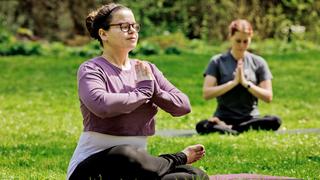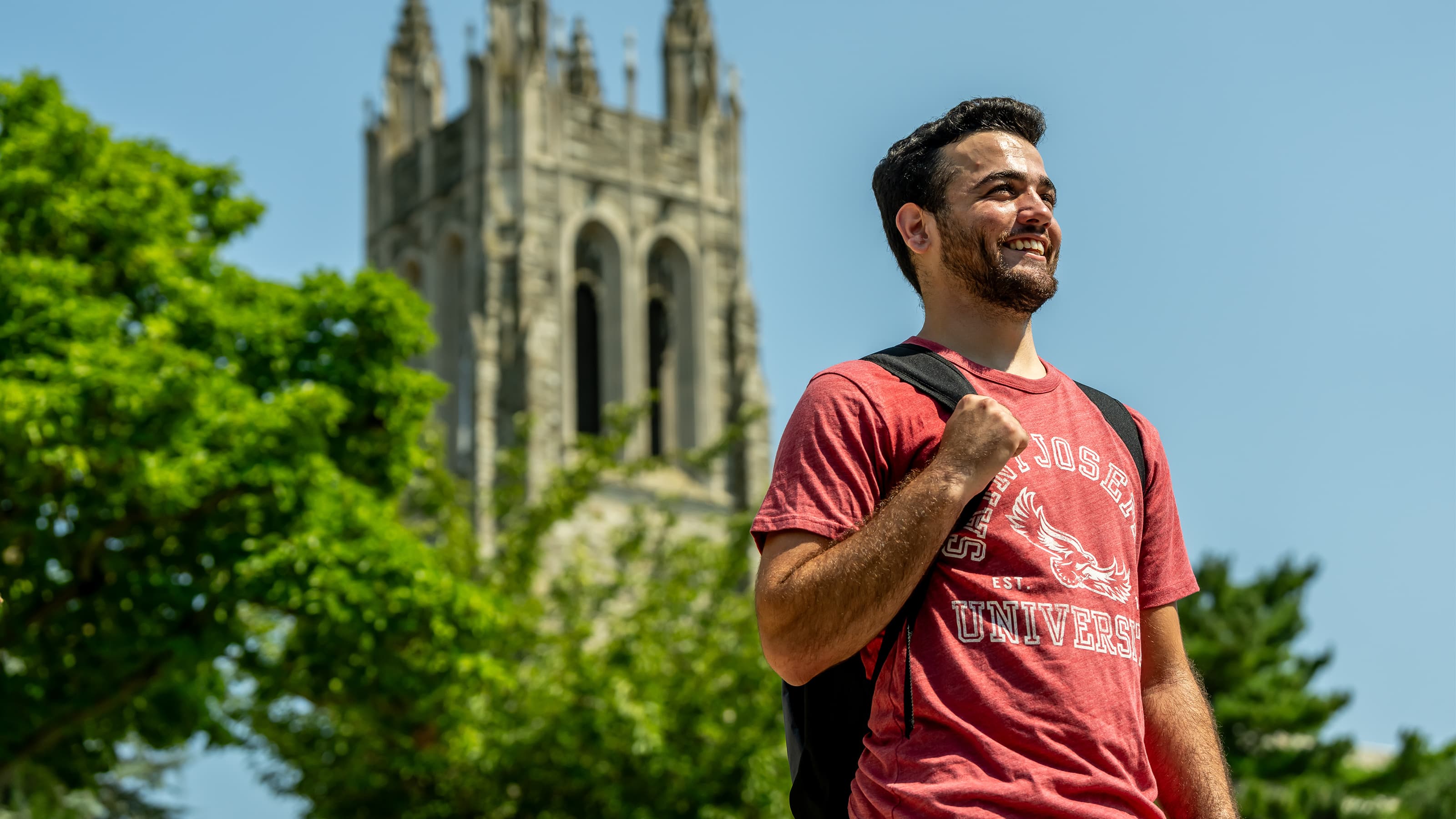Four Mental Health Tips from Saint Joseph’s New Clinical Mental Health Counseling Director
Shenika Jones, PhD, the inaugural director of Saint Joseph’s clinical mental health counseling master’s program, is determined to squash the stigma surrounding depression and provide helpful, sustainable tips to support good mental health.


October is National Depression and Mental Health Screening Month, dedicated to bringing awareness to the prevalence of depression and the need for accessible and affordable mental health screenings.
Shenika Jones, Ph.D., is the new director of Saint Joseph’s clinical mental health counseling master’s program in the School of Health Studies and Education. Jones has been working as a counselor educator for eight years, but comes to Saint Joseph's with a decade of experience in psychotherapy with individuals and groups.
“Just locally, the Main Line Health Community Health Needs Assessment noted that one in four residents has been diagnosed with a mental health condition in 2019,” says Jones. “But the same data shows that only 60% are receiving treatment.”
Not everyone experiences depression in the same way, but it can affect anyone at any time, especially in the pandemic landscape of today. When tensions are high and you’re feeling defeated, Jones offers four tips to keep you grounded.
ASK YOURSELF BIG QUESTIONS
“I really like the use of choice theory in reality therapy,” notes Jones. “Every component in reality therapy is about building stronger connections to satisfy your sense of belonging.”
Reality therapy focuses on improving present relationships and circumstances, while avoiding discussion of past events. This approach aims to teach people that even if they can’t control how they feel, they can control how they think and behave.
Asking yourself those fundamental questions: What do I want? What am I doing? Is it working for me? Can I make it better? ... Ultimately, that’s going to help you make better choices.
Shenika Jones, Ph.D.
“Asking yourself those fundamental questions: What do I want? What am I doing? Is it working for me? Can I make it better?” says Jones. “Ultimately, that’s going to help you make better choices for yourself.”
After these questions are answered, an individual must commit to executing on a plan for success. This kind of work is best done with a support person, like a counselor, who can maintain perspective on each unique situation.
BE INTENTIONAL
Making space for your mental health is of the utmost importance, but sometimes it can feel like there aren’t enough hours in the day to squeeze in self-care.
“Nothing happens unless you plan for it,” says Jones. “That’s something I constantly tell my students. And when you don’t intentionally plan for those quiet moments, those minutes are naturally filled with something else.”
Jones recommends scheduling self-care space and treating it as unavailable time during the day. Meditating, journaling, going for a walk — whatever it is that takes you to a peaceful place where your mind can slow down can count as self care.
You have to block out time for self-care, because it is so easy for it to fall to the wayside.
Shenika Jones, Ph.D.
“You have to block out time for self-care, because it is so easy for it to fall to the wayside,” says Jones. “And I know it may sound impossible because we’re all dealing with hectic calendars but if you don’t take that time for yourself, you’re going to start experiencing burnout, anxiety and depression.”
LEARN TO BREATHE
“Honestly, most of us don’t know how to breathe,” says Jones. “That can become a part of a person’s psychoeducation.”
Psychoeducation refers to integrating emotional and motivational aspects to enable clients to cope with illnesses or difficult situations. One of the most commonly recommended strategies is mindful breathing.
“Sometimes it can be paired with visualization techniques, like imagining your toes in the sand and a warm ocean breeze,” notes Jones. “But commonly, with anxiety, people tend to get so far ahead of themselves that this kind of breathing can help bring them back to the present moment.”
Deep breathing is practiced in and out of healthcare settings with people of all ages. Even on Sesame Street, characters practice “belly breathing” to calm themselves when feeling frustrated or angry, making deep breathing one of the most trusted tools for parents who are looking for some relief from tantrums.
Harvard Medical School credits deep breathing with triggering a person’s relaxation response, a state of profound rest that can be elicited in many ways, including meditation, yoga and progressive muscle relaxation. Harvard Health Publishing has more information on practicing proper breath control and implementing deep breathing into your daily routine.
“It's challenging at first,” says Jones. “Your mind is going to try to take you elsewhere, but you have to redirect your mind back to the present moment.”
It's challenging at first ... your mind is going to try to take you elsewhere, but you have to redirect your mind back to the present moment.
Shenika Jones, Ph.D.
FIND A COUNSELOR
“Counseling is never a one-size-fits all,” says Jones. “We want our counselors to lead people to solutions by learning what works and what doesn’t for each individual.”
Depression and anxiety can be isolating. Even fleeting moments of sadness can make people feel totally alone, which is why Jones reiterates the importance of connecting with supportive groups and networks.
“As counselors, we want to walk alongside people experiencing anxiety and depression as they journey away from those shells they’ve retreated into,” says Jones. “Having a counselor relationship can really help validate those feelings. You can look forward to your weekly session and rely on another voice to weigh in on your situation because sometimes, your inner voice can really start to negatively impact your sense of wellbeing.”
As counselors, we want to walk alongside people experiencing anxiety and depression as they journey away from those shells they’ve retreated into.
Shenika Jones, Ph.D.
Before COVID-19 took the world by storm, the Bureau of Labor Statistics projected nearly 100,000 new counseling jobs would be created through 2028 — that’s more than a 20% growth rate, far outpacing the 5.2% for all other occupations.
“Mental health is such a frequently unmet need that affects all socioeconomic groups,” says Jones. “COVID has only magnified these challenges. We’re seeing radical spikes in cases of anxiety, depression and drug and alcohol addiction.”
To find a counselor in your area, visit Healthy Minds Philly to take a free, anonymous mental health screening and get connected with professionals in the area.
“The Wheel of Wellness pulls in all aspects of our human selves — the physical, spiritual, psychological,” says Jones. “We as people are compelled to find balance in every area of our lives, but the thing is, we're always moving and shifting so we don’t always get it right.”
The best we can usually do is identify areas in our lives that need more attention and bring them into focus.
“Get out there and connect,” urges Jones. “That may be the piece of the puzzle that's missing for you.”
Interested in becoming a part of the solution? It is a great time to start your educational journey to become a counselor by applying to the Clinical Mental Health Counseling M.S. program at Saint Joseph’s.



